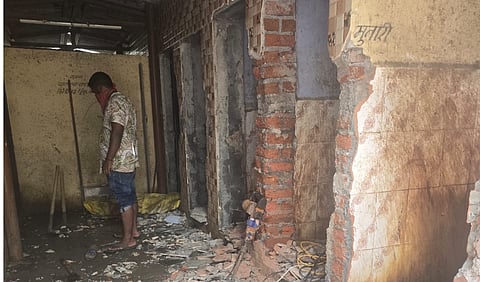
Mumbai- The morning sun cast long shadows across Morarji Nagar in Powai as Tabrez Sayyed Ali, a local Communist Party leader, stood with a noose around his neck. It wasn't a moment of despair—it was a cry for basic human dignity.
"Fasi Lagao, Shauchalay Banao" ("Hang Yourself to Build Toilets"), the residents chanted on January 10th, their voices echoing through the narrow lanes of Ward 121. What might seem like a dramatic gesture was, for them, a last resort—a way to shake the system awake to their most fundamental need.
Ali's eyes reflected the frustration of an entire community as he explained to The Mooknayak: "Going to the toilet is a basic need for everyone. Through this protest, we were trying to show how bad things have become—that if even this basic need isn't met, it feels like life itself is being taken away. We only wanted to send a strong message. We had no plan to hurt ourselves."
Behind him, the public toilet near IT Aurum Park stood as a monument to neglect. What should have been a place of relief for over 2,000 daily users had become a source of daily humiliation. The facility tells a story of broken promises: taps that haven't run water in months, toilet pots cracked beyond repair, flush systems that exist only in memory, and tiles that have given up their fight against time.
For the nearly 1,000 residents living in makeshift homes without private toilets, this isn't just an inconvenience—it's a daily assault on their dignity. Imagine rushing to work each morning, knowing that something as basic as using a toilet might become an ordeal. Picture parents having to explain to their children why they can't have what others take for granted.
The situation becomes even more heartbreaking when you consider the students. Nearly 5,000 young people pass through the adjacent examination center daily, many traveling from far-off places with hopes pinned on their futures. Instead of focusing on their studies, they're forced to navigate the nightmare of unusable facilities.
One woman, her voice heavy with resignation, shared her daily struggle: "There is no running water, no proper seating, and the smell is unbearable. We are forced to use it due to lack of alternatives." Her words carry the weight of countless mornings when basic human needs become battles to be fought.
Ali's frustration runs deeper than just broken toilets. It's about a system that seems to have forgotten its people. "We filed multiple RTI applications," he says, "but silence was the only response we received." The bureaucratic maze that citizens must navigate for something as basic as a functioning toilet speaks to a larger crisis of governance.
The numbers tell their own story of institutional failure. Approximately ₹22 crore was sanctioned for sanitation infrastructure in the past year, yet the toilets remain monuments to neglect. The work has been outsourced to private contractors who collect their payments while the community suffers in silence.
When the protest began, something remarkable happened. BMC officials, who had been unreachable for months, suddenly appeared. The power of collective action had pierced through layers of bureaucratic indifference. But even this moment of hope came with its own challenges—Ali found himself at the police station, detained for four hours for the crime of demanding basic facilities for his community.
Adinath Vanave, the structural engineer responsible for the area, finally offered a glimmer of hope: "There was a delay due to some departmental issues, but those hurdles have now been resolved. The work has started and is expected to be completed soon."
As the sun set over Powai that day, the residents had made their point. They had shown that when pushed to the brink, ordinary people can find extraordinary ways to demand their dignity. The noose around Ali's neck wasn't a symbol of defeat-it was a symbol of how far a community will go to claim what should never have been denied in the first place.
The story of Morarji Nagar is far from over. The residents have made it clear they will continue monitoring the work, their eyes fixed on the hope that soon, the most basic human need will no longer be a daily struggle. In their persistence lies a lesson for all of us: that dignity is not a privilege to be granted, but a right to be claimed.
Until then, every morning in Powai begins with the same question: Will today be the day when basic human dignity is finally restored?
You can also join our WhatsApp group to get premium and selected news of The Mooknayak on WhatsApp. Click here to join the WhatsApp group.